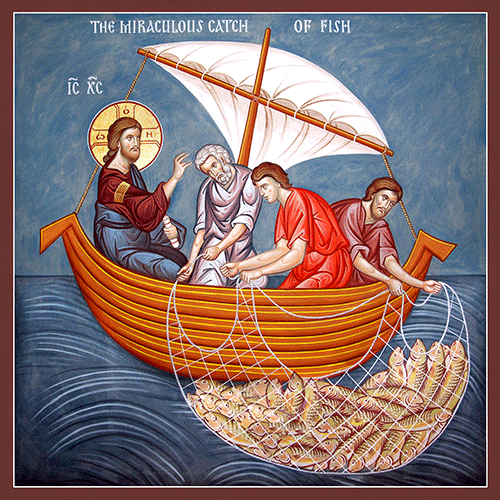The Great Fifty Days, colluding with our present distancing societal protocols, provides us with an unparalleled invitation to luxuriate in the resurrection accounts, and indeed in Jesus’ resurrection itself! Inhabit, stretch our scriptural legs a bit, poke and prod and putter about as we intentionally and reverently receive each and every salvific story. Why rush to Pentecost in this extended festival of new life?!

So today we take a picnic at the beach, a small fire crackling upon the rocky, sandy shoreline of Galilee’s expansive inland lake, the smell of sizzling fish and fresh bread filling our noses. The water lazily laps upon the smooth dark basalt rocks, dotted here and there with a few reeds and some impatient birds circling to take the house share of any leftover food. Here we are in John 21:9-14. The other disciples are simply enjoying the moment with their Risen Lord after a laborious and exhausting night fishing expedition. Of course Peter, trying to be helpful, tries to drag the over-full net over the gunwale (properly pronounced GUN-nell for those non-mariners) on to the beach in case the first course proves insufficient. Well now, 153 fresh fish will do nicely for our band of (Public Health Order revised gathering of less than 10) students with their beloved, miraculous Lord! Jesus is the host, they the guests. They eat in grateful, humbled silence, savoring this precious moment they will take (soon) to their graves. John states laconically, They knew it was the Lord. They knew how impossible it all was. They knew He should not have even been there in the first place. They knew this meal meant far more than brunch on the beach. Finally, they knew. Only then can John remind us that this was the third time the Johnannine Risen Jesus had appeared to them, and evidently third time is the charm!
This story once again is freighted with multiple meanings for them and for us. My best interpretation is this: At the time this gospel was circulated there were approximately 153 members of the Johannine church. Under great persecution in those closing years of the 1st century, they had stayed together and not been fragmented or split apart (yet). Their net is literally not torn despite growth and change. Their worship involved food, for them most likely a simple meal of bread and fish. Later this meal would evolve in a very complicated history to emerge in the medieval church as the Eucharist, or Holy Communion if we are Anglican about it. As Jesus distributed the bread and fish, so church leaders did the same when they gathered. And there was silence during their worship, to ponder the great mystery of the Risen Christ so present with them when they did this. How beautiful, how poignant, how simple a meal. They knew.
- Have you yet missed the gift of Holy Communion in this unexpected season of contagion?! How does the eucharist feed you spiritually and your faith?
- Without drama and unnecessary complication, do you ever stop to eat a simple meal at home and invoke the name and presence of Jesus?! If no, is now the time to start?!
- I am struck by their acknowledgement of silence. Isolation is not intentional silence! Are we taking daily time to be silent while inviting Christ to be palpably present with us here and now? If not, is now the time to start?!



